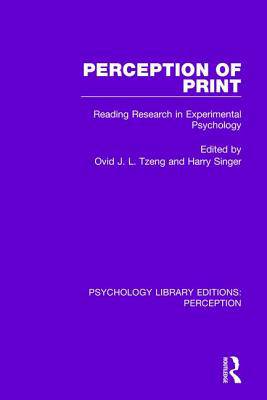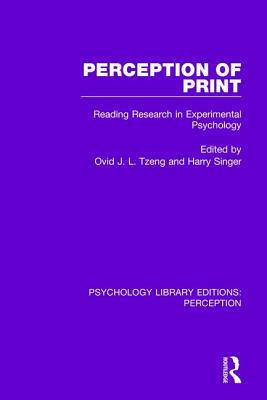
- Afhalen na 1 uur in een winkel met voorraad
- Gratis thuislevering in België vanaf € 30
- Ruim aanbod met 7 miljoen producten
- Afhalen na 1 uur in een winkel met voorraad
- Gratis thuislevering in België vanaf € 30
- Ruim aanbod met 7 miljoen producten
Perception of Print
Reading Research in Experimental Psychology
Omschrijving
In the late 1970s, reading research had become a true interdisciplinary endeavour with flavours of anthropology, artificial intelligence, cognitive psychology, educational psychology, linguistics, neuroscience and instructional technology.
Given appropriate integration, results from these diverse perspectives can enhance our understanding of reading behaviour tremendously, both in its acquisition and in its skilled functioning. Thus, the enthusiasm for such interdisciplinary interaction had been quite intense for some time. In the years before publication, the National Reading Conference had been doing everything possible to accelerate this interaction. Originally published in 1981, the chapters in this book are the fruits of that effort.
The research focuses on specifying skills in identifying alphabetical elements and the rules that govern their combination, on constructing models that characterize the recognition of individual words and the interpretation of texts, and on discovering what factors are responsible for blocking the normal acquisition process in many children. Chapters 2 to 12 of this book reflect these changing foci. They are nevertheless sandwiched by two chapters that deal with the historical background and future outlook of reading instruction.
Specificaties
Betrokkenen
- Uitgeverij:
Inhoud
- Aantal bladzijden:
- 332
- Taal:
- Engels
- Reeks:
- Reeksnummer:
- nr. 28
Eigenschappen
- Productcode (EAN):
- 9781138210776
- Verschijningsdatum:
- 13/03/2017
- Uitvoering:
- Hardcover
- Formaat:
- Genaaid
- Afmetingen:
- 156 mm x 233 mm
- Gewicht:
- 452 g

Alleen bij Standaard Boekhandel
Beoordelingen
We publiceren alleen reviews die voldoen aan de voorwaarden voor reviews. Bekijk onze voorwaarden voor reviews.










